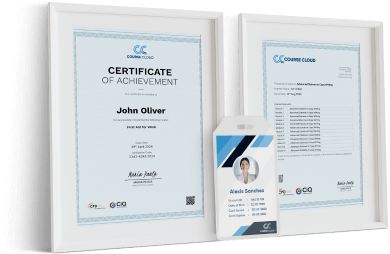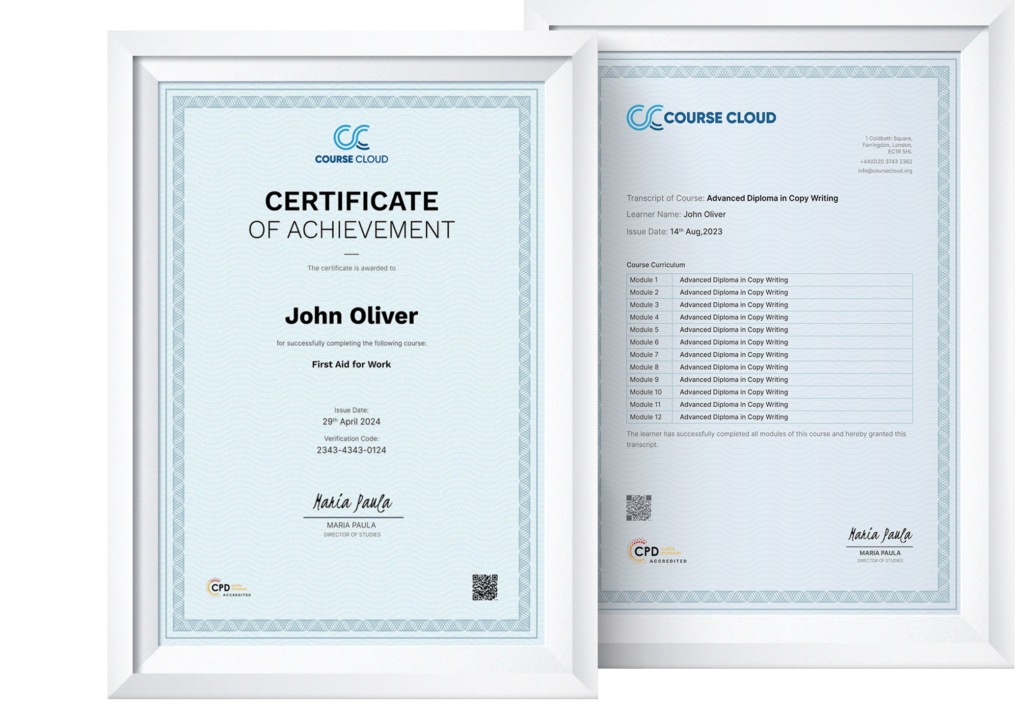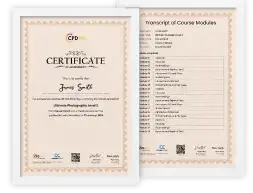Welcome to
Course Cloud
the best place for online learning!
Log In
Sign Up
Don’t have an account yet? Sign Up
Certificate in HR Audit
This Certificate in HR Audit course is tailored to help you gain in-depth knowledge and expertise through its comprehensive curriculum. Whether you’re looking to advance professionally or explore a new passion, this Certificate in HR Audit course equips you with the tools to succeed and stand out in the competitive market.
15 enrolled on this course
( 50% Off Limited Time )

This Course Includes
- 7 Units
- 1 Year Access
- 3 hours, 7 minutes
- Intermediate
- Accredited Certificate






Frequently asked questions
Can’t find the anwser you’re looking for ? Reach out to customer support team.
An HR skills audit assesses the skills, competencies, and qualifications of employees to ensure they align with organizational goals. It identifies skill gaps, helping organizations optimize training, recruitment, and development initiatives. Programs like CourseCloud’s Certificate in HR Audit provide insights into conducting such evaluations effectively.
The first step in the HR audit process is defining the scope and objectives. This involves identifying the specific HR functions, policies, or processes to be reviewed and establishing clear criteria for evaluation. Structured guidance, such as that offered in CourseCloud’s HR Audit program, helps navigate this phase seamlessly.
HR accounting focuses on quantifying the value of human resources, such as costs and returns on investment in employees. HR auditing evaluates HR policies, procedures, and practices for compliance, effectiveness, and alignment with organizational goals. While accounting emphasizes measurement, auditing emphasizes evaluation and improvement.
Organizations undertake HR audits to identify inefficiencies, ensure legal compliance, assess the effectiveness of HR policies, and align HR practices with strategic goals. Regular audits provide insights that drive continuous improvement and risk mitigation.
An HR auditor evaluates HR functions, policies, and practices to identify areas of improvement. Their responsibilities include reviewing compliance with laws, assessing the effectiveness of recruitment and training, and recommending actionable strategies to optimize HR operations. CourseCloud’s training equips HR auditors with the necessary tools and knowledge.
HR audits can be conducted by internal HR teams, external consultants, or professional HR auditors. Independence and expertise are key factors; professionals trained through platforms like CourseCloud bring objectivity and proficiency to the audit process.
Conducting an HR audit involves several steps: Define the audit scope and objectives. Collect data on HR policies, practices, and employee records. Analyze the data against established benchmarks or legal standards. Identify gaps, inefficiencies, or risks. Compile findings into a comprehensive report with recommendations. Implement and monitor corrective actions. Courses like those offered by CourseCloud simplify this process with step-by-step training.
Six Sigma for HR applies data-driven methodologies to improve HR processes, reduce inefficiencies, and enhance overall performance. It focuses on measurable outcomes, such as improving employee retention rates or streamlining recruitment processes.
While both audits aim to ensure accuracy, compliance, and efficiency, HR audits focus on policies, practices, and employee-related processes, whereas financial audits concentrate on monetary transactions and financial statements. Both require a systematic approach and adherence to standards.
The cost of an HR audit varies based on the scope, size of the organization, and whether it’s conducted internally or by an external consultant. External audits may range from a few hundred to several thousand pounds, depending on the complexity.
The duration of an HR audit depends on the organization’s size, the scope of the audit, and the level of detail required. A typical HR audit for a medium-sized organization may take anywhere from two weeks to a month.
The three levels of HR audit include compliance audits (ensuring legal adherence), functional audits (evaluating specific HR activities like recruitment), and strategic audits (aligning HR practices with organizational goals). Training programs like CourseCloud’s HR Audit Certificate cover these levels comprehensively.
An HR audit measures the effectiveness, compliance, and alignment of HR policies and practices. It evaluates areas such as recruitment, training, employee retention, compensation, legal compliance, and organizational culture.
To conduct a skills audit on yourself: List your current skills and qualifications. Compare them against the requirements of your desired role or goals. Identify skill gaps or areas for improvement. Create a plan for skill development, including training or certifications.
Yes, auditing is considered a technical skill as it requires specific knowledge of evaluation processes, standards, and methodologies. It also involves analytical thinking, attention to detail, and proficiency in using tools and frameworks, such as those covered in CourseCloud’s Certificate in HR Audit.


 Get Accredited Certificate
Get Accredited Certificate



 ALL COURSES FOR £49
ALL COURSES FOR £49

